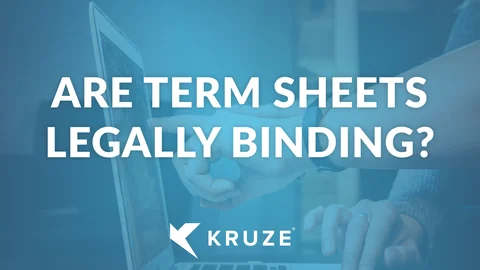
Term sheets can be a little bit of a gray area in the venture capital/startup world since certain elements, such as the confidentiality agreement, are legally binding. However, despite this, you may still hear of people “spilling the beans” and sharing details of the term sheet. Let’s look at these uncertainties.
Term Sheets and Founder Reputation
As we just mentioned, there is a lack of clarity regarding whether or not a term sheet is strictly legally binding. The way we tend to think about it is, instead of them being legally binding, term sheets are more “reputationally binding.” If you sign a term sheet with a venture capitalist, or a venture capitalist signs a term sheet with you, you should have every intention of going forward with that deal.
This is true from both sides, both for the VCs and for founders. If you’re a founder or a VC who pulls out of deals, contracts, or term sheets with investors/startups, word is going to get around. Understandably, neither venture capitalists nor founders like flakiness.
The spirit of the term sheet is that, at this point, those making the deal (the founders and investors) have officially agreed on the terms of that agreement. And now that everything is spelled out, all you need is the final documentation to be signed. That includes things such as:
- Stock purchase agreement
- Investor rights agreement
- Updated articles for the corporation
Avoid Re-Trades and Renegotiation
What you don’t really want to have to deal with are re-trades or last-minute renegotiations. In our experience, people who impose re-trades or try to renegotiate near the end of the deal process often get a bad reputation.
As a VC or a founder, you may be tempted to make last minute changes or requests. However, here at Kruze, we recommend only doing so if you uncover something, during due diligence for example, that’s bad enough to justify the disruption.
Ultimately, and we cannot stress this enough, at this point it really is about your reputation as a startup founder or a venture capitalist. If you’re the kind of person that’s going around re-trading or trying to change things up at the very last minute, especially when you are in the stronger position, that will always look bad on you.
Don’t Sign a Term Sheet You’re Not Serious About
Because reneging on a term sheet is a pretty serious blow to your reputation, make sure you don’t sign a term sheet that you don’t want to close on. Remember, when you do sign a term sheet you’re on the clock. The other party will be putting effort and good intentions behind it. If they find out that you are bailing on them or have an ulterior motive there is big potential for a lot of feelings to be hurt. And that leads to ramifications to your business down the road.
Be judicious and only sign something if you fully intend to go forward with it.
And - always work with an experienced lawyer. We’ve found that the best startup law firms have worked with pretty much all of the top VCs, so they know which investors have reputations that are good… or bad. Plus, you don’t want to get bad legal advice on something as important as selling part of your company!
If you have any other questions on term sheets, valuations, startup investing, startup accounting, or taxes, please contact us.
You can also follow our YouTube channel and our blog for information about accounting, finance, HR, and taxes for startups!








